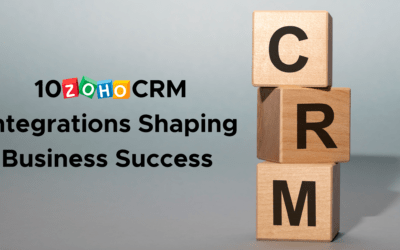In the quest for growth and success, one indispensable tool emerges a startup needs is a reliable Customer Relationship Management (CRM) system.
Every business, no matter its size or industry, needs to devise a means of maintaining its customer base and prospective customer data. Implementing customer relationship management (CRM) systems can significantly impact a business’s success. That is why startups looking for CRM software should be strategic about choosing the right platform for their business.
This article discusses some of the fundamentals of CRM systems for startups and the ways some companies that have successfully implemented customer relationship management systems and automation use CRM for business success.
Why do startups need CRM implementation?
Startups have a lot to gain by incorporating customer relationship management systems into their business strategies. Some reasons why your startup needs CRM implementation include:
Centralised data management: A sales CRM acts as a central hub for storing crucial customer information, interactions, and sales data. This accessibility ensures your team is always on the same page, fostering better collaboration.
Efficient lead management: Startups often juggle numerous leads. A CRM organises these leads, prioritises them, and automates follow-ups, ensuring no opportunities slip through the cracks.
Valuable customer insights: Businesses understand their customers better through data and analytics. CRM systems offer valuable insights into customer behaviour, enabling you to tailor your offerings.
CRM implementation is a strategic move that can reshape the way businesses interact with customers, streamline operations, and drive growth. However, the degree of success of these implementations varies across companies. Some achieve remarkable transformations, while others face challenges that hinder optimal utilisation.
As a startup just incorporating CRM, some challenges an effective CRM implementation will overcome include:
Disorganised Data: Startups often grapple with scattered data. A CRM system organises data efficiently, preventing loss and ensuring easy access.
Inefficient communication: communication breakdowns can hinder progress. CRM systems facilitate seamless communication among team members and with customers.
Lead neglect: Startup teams may inadvertently neglect leads when there is not a proper action taken. CRM automation ensures consistent follow-ups, increasing conversion rates.
The Power of CRMs and Automation for Startups
For startups, where every move is a strategic step towards building a sustainable business, CRM systems and automation act as potent catalysts. These tools streamline customer interactions, enhance data management, and facilitate personalised experiences.
One remarkable example of such CRMs is Zoho CRM, which offers an all-in-one CRM platform for startups. By centralising customer information, tracking interactions, and automating marketing workflows, Zoho empowers startups to cultivate meaningful customer relationships from inception.
Let us see a few benefits of CRM implementation for startups.
Improved Sales: A CRM system helps track leads, automate follow-ups, and streamline the sales process, leading to increased revenue.
Enhanced Customer Relationships: With access to customer data, your team can provide personalised experiences, fostering loyalty.
Data-Driven Decisions: CRM analytics offer valuable insights for making informed decisions.
Case Studies of Companies with Successful CRM Implementation
Amazon
Amazon’s success is built on a strong focus on the customer, and its effective utilisation of CRM has played a crucial role in this achievement. Amazon’s CRM software, developed internally, collects customer data during the purchase process.
This data is then utilised to personalise the online experience for users and gain a comprehensive understanding of the customer journey. The system acquires knowledge about customer behaviour, enhances relationships starting from the initial purchase, and minimises returns or instances of cart abandonment by analysing the customer’s e-commerce activities.
While a conventional CRM is sufficient for most businesses, Amazon has the capability to develop and maintain its own CRM with tailored features that seamlessly integrate with the Amazon platform. This custom-built CRM allows smooth operations, improved workflow, and excellent customer care.
What is the reason for customers’ continued returns? Amazon’s interface is user-friendly and straightforward. Through the system, you can access and review your personal order history, including details on your spending. Additionally, the system efficiently manages returns and ensures prompt handling. Tracking your purchase through every stage of the delivery process is effortless, and reordering is a piece of cake.
4 ways Amazon implements a CRM solution
Customised promotions
Amazon can continually sell to people by tapping into their preferences. And also offer them personalised experiences by providing recommendations based on their interests. Apple and Uber use Amazon’s CRM to send customers personalised offers and incentives based on their past purchases.
This is why a CRM system is essential for marketing. Customer service, sales, and marketing depend on it. To create the perfect marketing strategy, you must understand what your customers need, and CRM software can help you evaluate customer data to meet those demands.
Personal data storage
Amazon’s CRM keeps customers’ personal and payment information when they register an account to buy. It makes it easy for customers to buy again. Having put in place the right security to prevent fraud and protect personal data, customers can order with one click and have their items delivered the next day.
Remember that firms must follow the EU’s General Data Protection Regulation (GDPR) on data privacy. Trust increases spontaneously when customers are convinced that corporations are protecting their sensitive information. Building this layer within your client interaction is crucial.
Products recommendations
Amazon’s CRM has features for recommended products. Amazon recommends products based on past purchases to logged-in consumers. Customers may easily browse relevant products and see what others have bought. Offering these temptations without forcing customers helps Amazon make billions.
As a startup, your CRM system’s purchase history can also be used to provide excellent customer service. Based on what customers have bought or viewed, you may predict their wants, which can help your salespeople sell more.
Customer service
Amazon accounts allow customers to resolve most issues. Online returns are handled too. What needs to be discussed with a customer support representative? CRM is at the rescue again. They can resolve all issues with Amazon support staff who have their information, and this leads to happier consumers.
You can create email templates in your CRM. If you swiftly address a customer complaint, the customer may relax knowing their issue is being addressed. A timely response shows professionalism, and you cannot satisfy clients without an effective CRM implementation plan.
Coca-Cola
The CRM strategy of Coca-Cola is the foundation of its remarkable growth. On May 8, 1886, Dr. John Pemberton founded the company, which he later sold to Asa Griggs Candler and a few other people. It has been one of the greatest companies in the world.
The company’s success can be attributed primarily to its customer relationship management process. They launched a series of innovative personalised marketing campaigns by leveraging CRM strategies rather than focusing solely on the product.
4 Ways Coca-Cola Implements a CRM Solution
Identifying their target market
Coca-Cola targets all market categories as potential customers, ensuring that the refreshing needs of everyone are met.
Understanding the customer’s needs
They listen actively to hear what their customers want and are patient to understand their pain points. They also respond back to the customers in a way that conveys sincerity and in the simplest language.
Customer loyalty and offers
They use this marketing technique to reward customers and win more. Businesses can use the CRM to offer marketing promotions and offers to their customers and prospects, thereby winning more loyal customers.
Product Delivery
The CRM makes it possible to get the addresses of customers and their stores and deliver products to their physical addresses. The customer data obtained helped Coca-Cola successfully satisfy its customers’ demands.
Netflix
Netflix’s CRM implementation strategy has helped them gain a comprehensive understanding of customers and their desires, allowing them to predict their needs accurately.
With over 190 countries and 231 million paid memberships, Netflix is the global leader in streaming entertainment services. Their customers can pay on a monthly or annual basis to access Television series, films, and games across different genres and languages using a subscription model.
3 Ways Netflix Implements CRM Solutions
Intelligent content recommendation
Content recommendation is one of Netflix’s CRM strategies for retaining customers. If a customer watches programme A, it is primarily likely programme B will interest them, so they recommend it to them.
Massive library of shows
As of July 2023, there are 6,621 movies, series, and specials. This gives users many options to watch movies on demand according to the ones most appealing to their taste, as these varieties of shows are what keep users glued to their Netflix.
Continue Watching
Netflix’s AI algorithm sorts your viewed titles and estimates whether the member will continue watching or re-watch. Or perhaps they stopped watching the film because it was less attractive than they had imagined.
The ‘continue watching’ feature has been proven to be very effective in engaging and re-engaging users on the platform, increasing their satisfaction rate.
Airbnb
Airbnb’s success is fueled by its commitment to customer relationships, enabled by CRM systems. Hosts and guests interact through the platform, and CRM tools facilitate seamless communication, booking management, and issue resolution. Automation assists in handling reservations, payments, and feedback collection, fostering a sense of trust and community among users.
How to Know if a CRM is Right for Your Startup
The right CRM for your business helps you find leads, follow up with new prospects, and nurture them into the sales pipeline.
Whether startup or enterprise, the core of CRM lies in understanding and serving customers better. Successful implementation requires aligning processes with customer needs and preferences.
Alignment with Goals: Evaluate if a CRM aligns with your startup’s objectives, such as improving sales or enhancing customer relationships.
Resource Availability: Assess if you have the resources and commitment to implement and maintain a CRM effectively. Affordable CRMs such as Zoho CRM provide the resources you need to be trained as well.
Digital Transformation Enabler: CRMs are the bedrock of digital transformation. They provide the infrastructure necessary to integrate, analyse, and act upon vast amounts of customer data, fostering agility and innovation.
Holistic Data Utilisation: Enterprises like Coca-Cola and Unilever underline the importance of harnessing data to make informed decisions. A well-implemented CRM aggregates data from various touchpoints, offering a comprehensive view of customer interactions.
Adaptability and Scalability: As startups grow into enterprises, the scalability of CRM systems becomes evident. Opting for platforms that can accommodate growing customer bases and complex processes is vital.
Collaborative Integration: Integrating CRMs with other business systems, like marketing automation, sales tools, and analytics, creates a seamless ecosystem that enhances productivity and insights.
Conclusion
From startups striving to establish their presence to successful companies already implementing CRMs, the right CRM for your startup will pave the way for efficiency, growth, and customer-centricity.
The journey showcases how these tools transcend business scales, reshaping interactions and redefining success. As you embark on your own path, remember that the potency of CRM and automation lies not merely in their technology but in their ability to cultivate meaningful relationships and drive businesses towards a future marked by innovation and sustainable growth.
At Digital Socius, we understand that business needs are different, so if implementing and developing custom solutions is what your start-up needs or you simply would like to discuss what solution will be best for your business, contact us immediately.





0 Comments